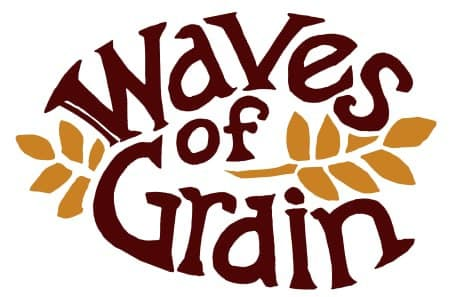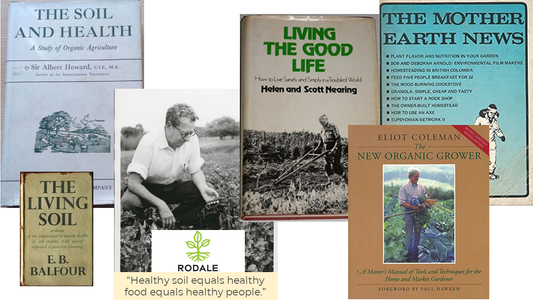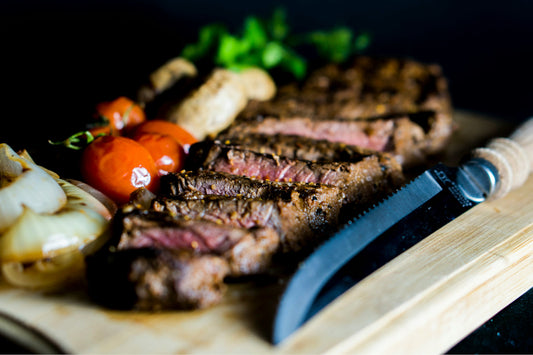I heard it from a customer again on Wednesday as she opened her box. We've been hearing that a lot, lately!
So today, we're going to share a little about Mountain Prairie Farms in concept and reality.
The idea for Mountain Prairie came in 2022 when the coop was proposed as part of a 5-part plan in Marianne's kitchen. (For those of you who don't know the Marianne I'm referring to, you'll have to wait as that is a different story.) Mary Lin drew the logo shortly after. I thought the "P" in Prairie looked like a gopher popping up, so we agreed and the brand was born.

Logo for the proposed Mountain Prairie product line of pre-made salads
The logo's look is carried across from the Waves of Grain and High Plains logos that Mary created, also in 2022, to look like the wood-cut "hippie" farm signs we remember from Maine and Vermont in the 1970s.
OK, back to the 5-point plan. It called for launching entrepreneur led companies using a coop-sponsored incubator. We needed a test case to prove the model. We needed to answer the question: Can the coop help to launch a new food brand using its unique sourcing and distribution networks? The farm is the most fundamental part of a local food system. Having our own farm this year meant we could create our own products. Mountain Prairie became a reality.
The Mountain Prairie product line would be basic: salad mixes and specific "greens" such as arugula and pea shoots. Maybe we'd go as far as carrots. The line would be premised on supply from multiple farms, but first we had to establish the products and markets.
On April 1st, the Nyland Community Association officially invited Waves of Grain to assume the grow operations of its 2-acre farm in Lafayette. We immediately started hundreds of lettuces, with the idea of transplanting half into the larger hoophouse and half out into the field.
At that time, the big hoophouse was empty and needed preparation for working.

Barren hoophouse with snow outside (early April)
After watering, adding compost, and broadforking, we put in 50 heads of red and 50 heads of green shortly after May 1st. Then we counted down the days to first harvest, which happened a month later for the Loveland Farmers Market.

A tidy first harvest in early June, of red and green heads (far right)
We planted another triple row of lettuce, then half of a third. We also put in new plants wherever the original plants were harvested. Today, you can still see the mounds of lettuce on the far right in the picture below.

A drunken revel of plants (early July)
It's been a great year for lettuce. Though we are told we can't grow lettuce in Colorado during the summer, Mountain Prairie will at least make the attempt. But our focus is naturally shifting to cucumbers and zucchinis. Then it will shift again to peppers, tomatoes, and eggplants. Finally, in the fall, it will be winter squashes, onions, and potatoes. Meanwhile, we are planting more greens, including fall greens. Someday soon we'll plant lettuce seeds and see if we can keep them cool enough to germinate.
We are hoping to keep a stable flow of salad and braising mixes throughout the year. So far, these mixes mostly come out of the "everything bagel" row shown dominating the right side in the photo above. The planting method is significant -- we create the mix right in the field, allowing harvesters to balance the greens at the time of picking, to optimize for abundance and quality. This affords a curatorial and gustatorial decision (by the person harvesting, seconded by the person bagging) to maximize flavor and enjoyment.
As the mixes evolve, we will refine them in response to your feedback and based on our experience growing in the hoop house and in the field. We are stiving for stable products with predictable supply and demand worthy of being called a "product line". Hint: Your feedback on the Mountain Prairie produce -- or anything at the coop -- is more than welcome, it is expected.
Up Next
The coop is also helping another farm startup this year, by providing a test market and feedback. We'll have another feature story soon to showcase Fringe Farm in Longmont. You will learn how microgreens are different than alfalfa sprouts on one hand, and baby greens on the other. Stay tuned!




